|
How does alcohol damage the liver? 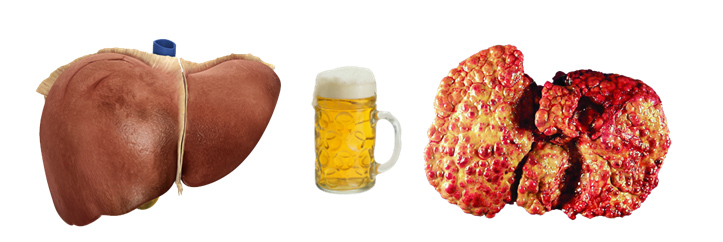
Alcohol damages the intestinal barrier. It disrupts the normal balance of intestinal good germs, resulting in the generation of toxins by harmful gut bacteria. Absorption of these toxins through the damaged intestinal surface into the blood stream and liver results in inflammation of the liver, eventually destroying the liver. A diagrammatic representation of the events which lead to alcoholic liver damage is shown here: 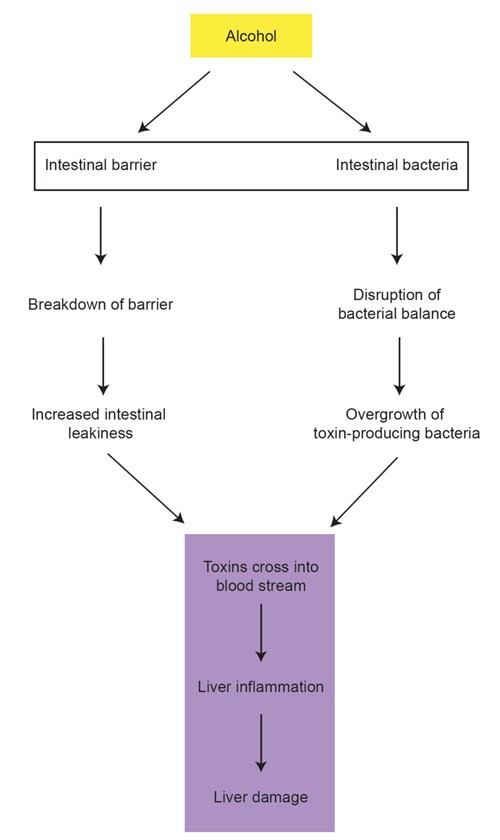
GG probiotic protects the stomach, intestines and liver from the damaging effects of alcohol. GG probiotic has the capability of breaking down alcohol to acetate, a harmless breakdown product. This capability has the potential of reducing the immediate damaging effect of alcohol. Since LACTOGG®’s probiotic strain can breakdown alcohol, it represents another system besides that of the liver, which can detoxify alcohol. 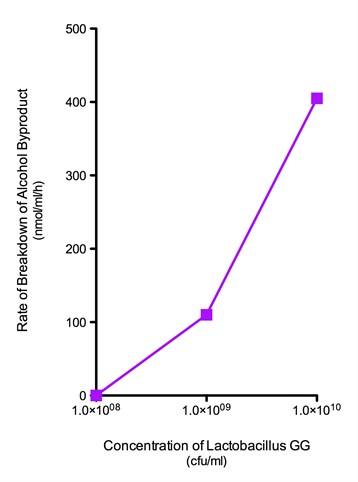
Breakdown of acetate by Lactobacillus GG [Nosovo et al 2000]
In animal studies, Lactobacillus GG conserved the intestinal barrier and maintained intestinal bacterial composition despite the presence of alcohol. Taking this probiotic strain protected the liver from being destroyed by toxins which were produced by the harmful intestinal germs. Most importantly, it could reverse inflammation in the liver. GG probiotic’s beneficial effect was noted in both prolonged alcohol consumption and after binge drinking. 
Microscopic appearance of liver cellular structure. Lactobacillus GG (L. GG) reverses alcoholic liver inflammation during prolonged alcohol consumption. [Wang et al 2011]
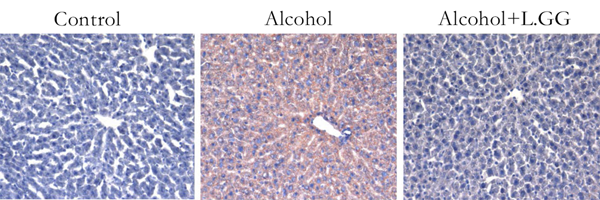
Microscopic appearance of liver cellular structure. Lactobacillus GG (L. GG) prevents alcoholic liver inflammation during sudden high dose alcohol consumption (binge drinking). [Wang et al 2011]
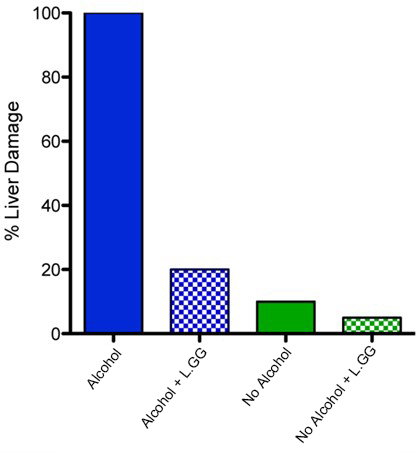
Lactobacillus GG protects the liver from being damaged by alcohol. [Forsyth et al. 2009]
How should LACTOGGВ® be taken? Supplement amount: At least 1 sachet or 1 capsule a day. References: Bajaj JS et al. Randomised clinical trial: Lactobacillus GG modulates gut microbiome, metabolome and endotoxemia in patients with cirrhosis. Aliment Pharmacol Ther 2014 May;39(10):1113-25. Bull-Otterson L et al. Metagenomic Analyses of alcohol induced pathogenic alterations in the intestinal microbiome and the effect of Lactobacillus rhamnosus GG treatment. PLOS One;8(1):e53028 Forsyth CB et al. Lactobacillus GG treatment ameliorates alcohol-induced intestinal oxidative stress, gut leakiness, and liver injury in a rat model of alcoholic steatohepatitis. Alcohol 2009;43(2):163-172 Nanji AA et al. Lactobacillus feeding reduces endotoxemia and severity of experimental alcoholic liver (disease). Proc Soc Exp Biol Med 1994;205(3):243-247 Wang Y et al. Lactobacillus rhamnosus GG treatment potentiates intestinal hypoxia-inducible factor, promotes intestinal integrity and ameliorates alcohol-induced liver injury. Am J Pathol 2011;179:2866-2875 Wang Y et al. Lactobacillus rhamnosus GG culture supernatant ameliorates acute alcohol-induced intestinal permeability and liver injury. Am J Physiol Gastrointest Liver Physiol 2012;303(1):G32-G41 Wang Y et al. Lactobacillus rhamnosus GG reduces hepatic TNF-О± production and inflammation in chronic alcohol-induced liver injury. J Nutr Biochem 2013;24:1609-1615 |




